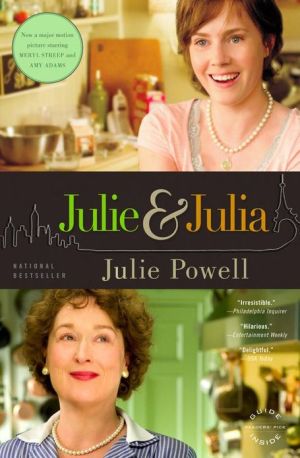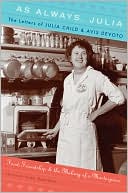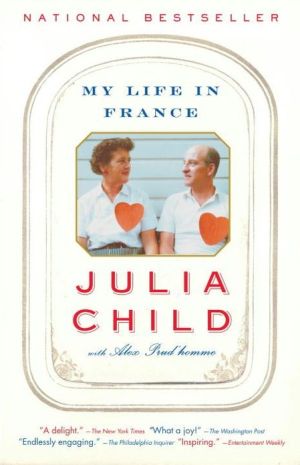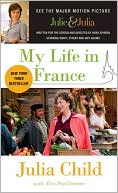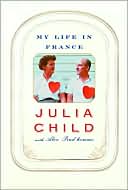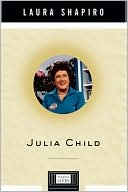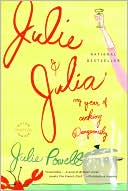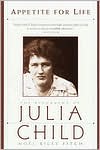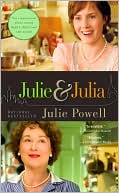Julie and Julia
Julie & Julia, the bestselling memoir that's "irresistible....A kind of Bridget Jones meets The French Chef" (Philadelphia Inquirer), is now a major motion picture. Julie Powell, nearing thirty and trapped in a dead-end secretarial job, resolves to reclaim her life by cooking in the span of a single year, every one of the 524 recipes in Julia Child's legendary Mastering the Art of French Cooking. Her unexpected reward: not just a newfound respect for calves' livers and aspic, but a new...
Search in google:
With the humor of Bridget Jones and the vitality of Augusten Burroughs, Julie Powell recounts how she conquered every recipe in Julia Child's Mastering the Art of French Cooking and saved her soul. Julie Powell is 30 years old, living in a tiny apartment in Queens and working at a soul-sucking secretarial job that's going nowhere. She needs something to break the monotony of her life, and she invents a deranged assignment. She will take her mother's worn, dog-eared copy of Julia Child's 1961 classic Mastering the Art of French Cooking, and she will cook all 524 recipes -- in the span of one year. At first she thinks it will be easy. But as she moves from the simple Potage Parmentier (potato soup) into the more complicated realm of aspics and crepes, she realizes there's more to Mastering the Art of French Cooking than meets the eye. And somewhere along the line she realizes she has turned her outer-borough kitchen into a miracle of creation and cuisine. She has eclipsed her life's ordinariness through spectacular humor, hysteria, and perseverance. About the Author Born and raised in Austin, Texas, JULIE POWELL has resided in one place or another in the outer boroughs of New York City for the past eight years. Currently, she lives in Long Island City, New York, with her husband, Eric, three cats, and a snake. The Washington Post - Lauren F. Winner Toward the end of the book, unfortunately, Powell's descriptions of the journalists who get interested in the Julie/Julia Project begin to overwhelm the project itself…Still…Powell is offbeat, eccentric and never too self-serious. Moreover, she understands something important. In an era when our bosses expect us to spend our lives at the office, she understands that life can't be all about your job. In an era when hostesses are praised for the food they picked up at Zabar's, she understands that there is something glorious and elemental in cooking. She has introduced ritual and meaning into an ordinary life. Not everyone will find her ritual and meaning with Julia Child, of course, but this book will inspire and encourage readers to find it somewhere.
When I was a kid, my dad used to love to tell the story about finding five-year-old Julie curled up in the back of his copper-colored Datsun ZX immersed in a crumpled back issue of the Atlantic Monthly. He told that one to all the guys at his office, and to the friends he and my mom went out to dinner with, and to all of the family who weren't born again and likely to disapprove. (Of the Atlantic, not Z-cars.) \ I think the point behind this was that I'd been singled out as an early entrant to the ranks of the intellectually superior. And since I was awful at ballet and tap dancing, after all, always the last one to make it up the rope in gym class, a girl neither waifish nor charming in owlish red-rimmed glasses, I took my ego-petting where I could get it. But the not-very-highbrow truth of the matter was that the reading was how I got my ya-yas out.\ For the sake of my bookish reputation I upgraded to Tolstoy and Steinbeck before I understood them, but my dark secret was that really, I preferred the junk. The Dragonriders of Pern, Flowers in the Attic, The Clan of the Cave Bear. This stuff was like my stash of Playboys under the mattress. I waited until my camp counselor left the cabin to steal the V. C. Andrews she stashed behind her box of Tampax. I nicked my mom's Jean Auel, and had already gotten halfway through before she found out, so she could only wince and suppose there was some educational value, but no Valley of Horses for you, young lady.\ Then adolescence set in well and proper, and reading for kicks got shoved in the backseat with the old Atlantics. It had been a long time since I'd done anything with the delicious, licentious cluelessness that I used to read those books - hell, sex now wasn't as exciting as reading about sex used to be. I guess nowadays your average fourteen-year-old Texan possesses exhaustive knowledge of the sexual uses of tongue studs, but I doubt the information excites her any more than my revelations about Neanderthal sex.\ You know what a fourteen-year-old Texan doesn't know shit about? French food.\ A couple of weeks after my twenty-ninth birthday, in the spring of 2002, I went back to Texas to visit my parents. Actually, Eric kind of made me go. "You have to get out of here," he said. The kitchen drawer that broke two weeks after we moved in, and was never satisfactorily rehabilitated, had just careened off its tracks yet again, flinging Pottery Barn silverware in all directions. I was sobbing, forks and knives glittering at my feet. Eric was holding me in one of those tight hugs like a half nelson, which he does whenever he's trying to comfort me when what he really wants to do is smack me.\ "Will you come with me?" I didn't look up from the snot stain I was impressing upon his shirt.\ "I'm too busy at the office right now. Besides, I think it's better if you go by yourself. Hang out with your mom. Buy some clothes. Sleep in."\ "I have work, though." "Julie, you're a temp. What's temping for if you can't run off and take a break sometimes? That's why you're doing it, right?" I didn't like to think about why I was temping. My voice went high and cracked. "Well, I can't afford it."\ "We can afford it. Or we can ask your parents to pay." He grabbed my chin and lifted it up to his face. "Julie. Seriously? Go. Because I can't live with you like this anymore." So I went - my mom bought me the ticket for a late birthday present. A week later I flew into Austin, early enough to grab lunch at Poke-Jo's.\ And then, right in the middle of my brisket sandwich and okra, less than a month after I turned twenty-nine, Mom dropped the Pushing Thirty bomb for the very first time.\ "Jesus, Mom!" "What?" My mother has this bright, smiling, hard tone that she always uses when she wants me to face facts. She was using it now. "All I'm saying is here you are, miserable, running away from New York, getting into a bad place with Eric, and for what? You're getting older, you're not taking advantage of the city, why do this to yourself?"\ This was exactly the one thing I had come to Austin to not talk about. I should have known my mother would dig in like a goddamned rat terrier.\ I had gone to New York like everybody else goes to New York - just as the essential first step for a potato destined for soup is to have its skin peeled off, the essential starting point for an aspiring actor is to move to New York. I preferred jobs that did not require auditions, which, since I neither looked like Renée Zellweger nor was a terribly good actor, proved to be a problem. Mostly what I'd done was temp, for (to name a few): the photocopier contractor for the UN; the Asian American businesses underwriting department at AIG; the vice president of a broadband technology outfit with an amazing office looking out onto the Brooklyn Bridge, which folded about two weeks after I got there; and an investment firm specializing in the money matters of nunneries. Recently, I'd started work at a government agency downtown.\ It looked like they were going to offer to bring me on permanently - eventually all the temp employers offered to let you go perm - and for the first time, I was considering, in a despairing sort of way, doing it. It was enough to make me suicidal even before my mom started telling me I was getting old. Mom should have known this, but instead of apologizing for her cruelty she just popped another piece of fried okra into her mouth and said, "Let's go shopping- your clothes are just awful!"\ The next morning I lingered at my parents' kitchen table long after they'd both left for work, wrapped up in a well-worn gray flannel robe I'd forgotten I had, sipping coffee. I'd finished the Times crossword and all the sections except for Business and Circuits, but didn't yet have enough caffeine in my system to contemplate getting dressed. (I'd overindulged in margaritas the night before, not at all an unusual occurrence when visiting the folks in Austin.) The pantry door stood ajar, and my aimless gaze rested on the bookshelves inside, the familiar ranks of spines lined up there. When I got up to fill my cup one last time, I made a detour and took one of the books - Mastering the Art of French Cooking, Vol1. , my mom's old 1967 edition, a book that had known my family's kitchen longer than I had. I sat back down at the table at which I'd eaten a thousand childhood afternoon snacks and began flipping through, just for the hell of it.\ When I was a kid, I used to look at MtAoFC quite a lot. Partly it was just my obsession with anything between two covers, but there was something else, too. Because this book has the power to shock. MtAoFC is still capable of striking deep if obscure zones of discomfort. Find the most pale, pierced and kohl-eyed, proudly pervy hipster you can and ask her to cook Pâté de Canard en Crote, aided only by the helpful illustrations on pages 571 through 575. I promise you, she'll be fleeing back to Williamsburg, where no one's going to make her bone a whole duck, faster than you can say, "trucker hats are soooo five minutes ago."\ But why? What is it about this book? It's just an old cookbook, for God's sake. Yet vegetarians, Atkinsers, and South Beach bums flare their nostrils at the stink of apostasy between its covers. Self-proclaimed foodies spare a smile of fond condescension before returning to their Chez Panisse cookbooks. By all rights, I should feel this way too. I am, after all, that ultimate synthesis of urban flakiness and suburban self-righteousness, the New York actress.\ Well, actually, I guess I can't say that, since I've never had a real acting job. And to tell the truth - it's time I faced facts here- I never really even tried. But if I'm not a New York actress, what am I? I'm a person who takes a subway from the outer boroughs to a lower Manhattan office every morning, who spends her days answering phones and doing copying, who is too disconsolate when she gets back to her apartment at night to do anything but sit on the couch and stare vacantly at reality TV shows until she falls asleep.\ Oh God. It really was true, wasn't it? I really was a secretary. When I looked up from MtAoFC for the first time, half an hour after I opened it, I realized that deep down, I'd been resigned to being a secretary for months - maybe even years.\ That was the bad news. The good news was that the buzzing in my head and queasy but somehow exhilarating squeeze deep in my belly were reminding me that I might still, after all, be something else.\ Do you know Mastering the Art of French Cooking ? You must, at least, know of it - it's a cultural landmark, for Pete's sake. Even if you just think of it as the book by that lady who looks like Dan Aykroyd and bleeds a lot, you know of it. But do you know the book itself ? Try to get your hands on one of the early hardback editions- they're not exactly rare. For a while there, every American housewife who could boil water had a copy, or so I've heard.\ It's not lushly illustrated; there are no shiny soft-core images of the glossy-haired author sinking her teeth into a juicy strawberry or smiling stonily before a perfectly rustic tart with carving knife in hand, like some chilly blonde kitchen dominatrix. The dishes are hopelessly dated - the cooking times outrageously long, the use of butter and cream beyond the pale, and not a single reference to pancetta or sea salt or wasabi. This book hasn't been on the must-have list for enterprising gourmands in decades. But as I held it in my hands that morning, opened its cover spangled with tomato-colored fleurs-de-lys, skimmed through its yellowed pages, I felt like I'd at last found something important. Why? I bent again over the book's pages, searching for the cause of this strange feeling. It wasn't the food exactly. If you looked hard enough, the food started to feel almost beside the point. No, there was something deeper here, some code within the words, perhaps some secret embedded in the paper itself.\ I have never looked to religion for comfort - belief is just not in my genes. But reading Mastering the Art of French Cooking,- childishly simple and dauntingly complex, incantatory and comforting - I thought this was what prayer must feel like. Sustenance bound up with anticipation and want. Reading MtAoFC was like reading pornographic Bible verses.\ So naturally when I flew back to New York that May, I had Mom's copy of the book stashed in my bag.\ The thing you learn with Potage Parmentier is that "simple" is not exactly the same as "easy." It had never occurred to me that there was a difference until Eric and I sat down on our couch the night of my appointment at the gynecologist's, three months after stealing my mother's forty-year-old cookbook, and took our first slurps of Julia Child's potato soup.\ Certainly I had made easier dinners. Unwrapping a cellophaneswathed hunk of London broil and tossing it under the broiler was one method that came immediately to mind. Ordering pizza and getting drunk on Stoli gimlets while waiting for it to arrive, that was another favorite. Potage Parmentier didn't even hold a candle, in the easy department.\ First you peel a couple of potatoes and slice them up. Slice some leeks, rinse them a couple of times to get rid of the grit- leeks are muddy little suckers. Throw these two ingredients in a pot with some water and some salt. Simmer it for forty-five minutes or so, then either "mash the vegetables in the soup with a fork" or pass them through a food mill. I didn't have a food mill, and I wasn't about to mash up vegetables with a fork. What I had was a potato ricer.\ Well, technically it was Eric's potato ricer. Before we were married, years ago, before Atkins hit, mashed potatoes used to be Eric's specialty. For a while, before we learned the value of Brooklyn storage space, we'd had this tradition where I'd get him arcane kitchen gadgets, the not-very-funny joke being that he didn't actually cook at all, except for the mashed potatoes. The ricer is the only survivor from this period. It was his Christmas present the year we were in the railroad apartment on Eleventh between Seventh and Eighth-this was before we got priced out of Park Slope entirely. I'd sewn stockings for the both of us out of felt- his is red with white trim, mine white with red-from a pattern in the Martha Stewart Living holiday issue that year. We still have them, even though I can't sew and they're totally kattywhompus: the stitching uneven, the decorative cuffs bunched and crooked. They're also way too small for things like ricers. I stuffed it in anyway. Hanging on the mantel of the nonfunctional fireplace in the bedroom, the stocking looked like Santa had brought Eric a Luger. I've never been much good at stocking stuffers.\ Once the leeks and potatoes have simmered for an hour or so, you mash them up with a fork or a food mill or a potato ricer. All three of these options are far more of a pain in the neck than the Cuisinart-one of which space-munching behemoths we scored when we got married - but Julia Child allows as how a Cuisinart will turn soup into "something un-French and monotonous." Any suggestion that uses the construction "un-French" is up for debate, but if you make Potage Parmentier, you will see her point. If you use the ricer, the soup will have bits- green bits and white bits and yellow bits - instead of being utterly smooth. After you've mushed it up, just stir in a couple of hefty chunks of butter, and you're done. JC says sprinkle with parsley but you don't have to. It looks pretty enough as it is, and it smells glorious, which is funny when you think about it. There's not a thing in it but leeks, potatoes, butter, water, pepper, and salt.\ One interesting thing to meditate on while you're making this soup is potatoes. There's something about peeling a potato. Not to say that it's fun, exactly. But there's something about scraping off the skin, and rinsing off the dirt, and chopping it into cubes before immersing the cubes in cold water because they'll turn pink if you let them sit out in the air. Something about knowing exactly what you're doing, and why. Potatoes have been potatoes for a long, long time, and people have treated them in just this way, toward the end of making just such a soup. There is clarity in the act of peeling a potato, a winnowing down to one sure, true way. And even if afterward you do push it through some gadget you got at Crate and Barrel, the peeling is still a part of what you do, the first thing.\ I was supposed to have spent my twenties (a) hammering away for ninety hours a week at some high-paying, ethically dubious job, drinking heavily, and having explosive sex with a rich array of twenty-something men; (b) awaking at noon every day in my Williamsburg loft to work on my painting/poetry/knitting/ performance art, easily shaking off the effects of stylish drugs and tragically hip clubs and explosive sex with a rich array of twenty-something men (and women if I could manage it); or (c) pursuing higher education, sweating bullets over an obscure dissertation and punctuating my intellectual throes with some pot and explosive sex with a rich array of professors and undergrads. These were the models, for someone like me.\ But I did none of these things. Instead, I got married. I didn't mean to, exactly. It just kind of happened.\ Eric and I were high school sweethearts. Wait, it gets worse. We were in a high school play together. Our courtship was straight out of one of the ickier films from the John Hughes oeuvre, Some Kind of Wonderful, maybe-all kinds of misunderstandings and jealous boyfriends and angst-ridden stage kisses. In other words, the sort of too-typical high school romance that people of our generation are meant to get over and cover up later on. But we didn't. Somehow we never got around to the breaking-up part. At the age of twenty-four, when we were still sleeping together and reasonably satisfied with the whole toilet-seat-and-toothpaste-cap situation, we went ahead and got married.\ Please understand - I love my husband like a pig loves shit. Maybe even more. But in the circles I run in, being married for more than five years before reaching the age of thirty ranks real high on the list of most socially damaging traits, right below watching NASCAR and listening to Shania Twain. I'm used to getting questions like "Is he the only person you've ever had sex with?" or, even more insultingly, "Are you the only person he's ever had sex with?"\ All this to say that sometimes I get a little defensive. Even with Isabel, who I've known since kindergarten, and Sally, my freshmanyear roommate, and Gwen, who comes over to eat at our apartment every weekend and adores Eric. I would confess to none of them the thing I sometimes think, which is: "Eric can be a little pushy." I couldn't hack the hastily smothered expressions of dismay and smug I-told-you-so eyebrows; I know my friends would imagine something between the The Stepford Wives and a domestic abuse PSA narrated by J-Lo. But I mean neither shoving matches nor domineering at dinner parties. I just mean that he pushes. He can't be satisfied with telling me I'm the most gorgeous and talented woman on the planet and that he would die without me, while mixing me a dry Stoli gimlet. No, he has to encourage. He has to make suggestions. It can be most annoying.\ So I made this soup, this Potage Parmentier, from a recipe in a forty-year-old cookbook I'd stolen from my mother the previous spring. And it was good- inexplicably good. We ate it sitting on the couch, bowls perched on knees, the silence broken only by the occasional snort of laughter as we watched a pert blonde high school student dust vampires on the television. In almost no time we were slurping the dregs of our third servings. (It turns out that one reason we're so good together is that each of us eats more and faster than anyone either of us has ever met; also, we both recognize the genius of Buffy the Vampire Slayer.) Earlier that evening, after the gynecologist appointment, when I was standing in the Korean deli staring at produce, I'd been thinking, "I'm twenty-nine, I'm never going to have kids or a real job, my husband will leave me and I'll die alone in an outer-borough hovel with twenty cats and it'll take two weeks for the stench to reach the hall." But now, three bowls of potato soup later, I was, to my relief, thinking of nothing much at all. I lay on my back on the couch, quietly digesting. Julia Child's soup had made me vulnerable.\ Eric saw an in, and took it. "That was good, honey." I sighed my agreement.\ "Real good. And there wasn't even any meat in it." (Eric is a sensitive twenty-first-century sort of guy, but a Texan nevertheless, and the idea of a dinner without animal flesh gets him a little panicky.)\ "You're such a good cook, Julie. Maybe you should go to culinary school."\ I'd started cooking in college, basically to keep Eric in my thrall. In the years since, though, the whole thing had blown a little out of proportion. I don't know if Eric felt pride that he had introduced me to my consuming passion, or guilt that my urge to satisfy his innocent liking for escargot and rhubarb had metastasized into an unhealthy obsession. Whatever the reason, this thing about cooking school had developed into one of our habitual dead-end alleys of conversation. I was too deliciously idle after my soup to get ticked off about it, and just snorted quietly. Even that indication that he had my ear, though, was a tactical error. I knew it as soon as I'd made a sound. I squeezed my eyes shut, feigning sudden sleep or deafness.\ "Seriously. You could go to the Culinary Institute! We could move out to the Hudson Valley, and you could just spend all your time learning to be a chef."\ And then, no sooner than I'd cautioned myself against it, I made tactical error #2: "They won't let me in without professional experience. I'd have to go peel potatoes for two-fifty an hour for six months. You want to support me with all your big bucks while I do that?"\ Giving in to the enticing prospect of emasculating my husband. Always, always a mistake.\ "Maybe some other school to start, then- somewhere here in the city?"\ "We can't afford it."\ Eric didn't answer. He sat quietly on the edge of the couch with his hand on my shin. I thought about kicking it off, but the shin seemed a neutral enough spot. One of the cats jumped up onto my chest, sniffed my breath, then stalked off stiff-legged, her mouth open in faint disgust.\ "If I wanted to learn to cook, I'd just cook my way through Mastering the Art of French Cooking, . ." It was an odd sort of statement to make drip with sarcasm, but I managed it anyway. Eric just sat there.\ "Not that it would do me any good, of course. Can't get a job out of that." "At least we'd eat good for a while."\ Now I was the one who said nothing for a moment, because of course he was right about that.\ "I'd be exhausted all the time. I'd get fat. We'd have to eat brains. And eggs. I don't eat eggs, Eric. You know I don't eat eggs." "No. You don't." "It's a stupid idea."\ Eric said nothing for a while. Buffy had ended and the news was on-a correspondent was standing on a flooded street in Sheepshead Bay, saying something about a broken water main. We sat on the couch in our stuffy Bay Ridge living room, staring at the screen as if we gave a damn. All around us teetered towers of boxes, the looming reminder of our upcoming move.\ When I look back on it now, it is as if I could actually hear the taut creak of a fisherman giving out just a tiny bit of line when Eric said: "You could start a blog."\ I cut my eyes over to him in irritation, a massive white-skinned shark thrashing its tail.\ "Julie. You do know what a blog is, don't you?" Of course I didn't know what a blog was. It was August of 2002. Nobody knew about blogs, except for a few guys like Eric who spend their days using company computers to pursue the zeitgeist. No issue of domestic or international policy was too big, no pop-culture backwater too obscure; from the War on Terror to Fear Factor, it was all one big, beautiful sliding scale for Eric. "You know, like a Web site sort of thing. Only it's easy. You don't have to know anything about anything."\ "Sounds perfect for me." "About computers, I mean." "Are you going to make me that drink, or what?" "Sure."\ And he did. He left me alone. He was free to, now that he knew the hook was sunk.\ Lulled by the calming music of ice clattering in the cocktail shaker, I began to ponder; this life we had going for ourselves, Eric and I, it felt like the opposite of Potage Parmentier. It was easy enough to keep on with the soul-sucking jobs; at least it saved having to make a choice. But how much longer could I take such an easy life? Quicksand was easy. Hell, death was easy. Maybe that's why my synapses had started snapping at the sight of potatoes and leeks in the Korean deli. Maybe that was what was plucking deep down in my belly whenever I thought of Julia Child's book. Maybe I needed to make like a potato, winnow myself down, be a part of something that was not easy, just simple.\ Just then Eric emerged again from the kitchen, carrying two Stoli gimlets. He handed off one of the glasses to me, carefully, so as not to spill anything over those treacherous martini lips, and I took a sip. Eric always made the best gimlets- icy cold, very dry, with an almost-not-there shade of chartreuse lingering in their slightly oily depths.\ "Okay," I said, taking another sip as Eric sat down beside me. "Tell me again about this blog thing?"\ And so, late that evening, a tiny line dropped into the endless sea of cyberspace, the slenderest of lures in the blackest of waters.
\ From Barnes & NobleSome people go on pilgrimages; Julie Powell attempted to master one cookbook. Thirty years old, bored with her job, hating her Queens apartment, Powell decided to transcend her life by concocting all 524 recipes in Julia Child's 1961 classic Mastering the Art of French Cooking -- in a single year. Replicating Child's kitchen artistry at such short notice tested Julie's skill and stamina, not to mention her husband's patience; but it did produce a high-spirited, sometimes hilarious memoir.\ \ \ \ \ Boston Globe"Laugh-out-loud funny."\ \ \ Washington Post Book World"A really good book."\ \ \ \ \ Boston Globe"Laugh-out-loud funny."\ \ \ \ \ Washington Post Book World"A really good book."\ \ \ \ \ David KampWhen she's focused on the cooking itself, Powell shows signs of being one of our better, loopier culinary thinkers, more in the iconoclast mode of M. F. K. Fisher than the rhapsodic, sun-dappled vein of Saveur magazine at its most-perfect-peach fetishizing.\ — The New York Times Book Review\ \ \ \ \ Lauren F. WinnerToward the end of the book, unfortunately, Powell's descriptions of the journalists who get interested in the Julie/Julia Project begin to overwhelm the project itself…Still…Powell is offbeat, eccentric and never too self-serious. Moreover, she understands something important. In an era when our bosses expect us to spend our lives at the office, she understands that life can't be all about your job. In an era when hostesses are praised for the food they picked up at Zabar's, she understands that there is something glorious and elemental in cooking. She has introduced ritual and meaning into an ordinary life. Not everyone will find her ritual and meaning with Julia Child, of course, but this book will inspire and encourage readers to find it somewhere.\ —The Washington Post\ \ \ \ \ Publishers WeeklyPowell became an Internet celebrity with her 2004 blog chronicling her yearlong odyssey of cooking every recipe in Julia Child's Mastering the Art of French Cooking. A frustrated secretary in New York City, Powell embarked on "the Julie/Julia project" to find a sense of direction, and both the cooking and the writing quickly became all-consuming. Some passages in the book are taken verbatim from the blog, but Powell expands on her experience and gives generous background about her personal life: her doting husband, wacky friends, evil co-workers. She also includes some comments from her "bleaders" (blog readers), who formed an enthusiastic support base. Powell never met Julia Child (who died last year), but the venerable chef's spirit is present throughout, and Powell imaginatively reconstructs episodes from Child's life in the 1940s. Her writing is feisty and unrestrained, especially as she details killing lobsters, tackling marrowbones and cooking late into the night. Occasionally the diarist instinct overwhelms the generally tight structure and Powell goes on unrelated tangents, but her voice is endearing enough that readers will quickly forgive such lapses. Both home cooks and devotees of Bridget Jones-style dishing will be caught up in Powell's funny, sharp-tongued but generous writing. Agent, Sarah Chalfant. (Sept.) Copyright 2005 Reed Business Information.\ \ \ \ \ Library JournalLife wasn't working out the way 29-year-old Powell had anticipated-working a dead-end job at a government agency; living in a cramped, dingy apartment in Queens; and worrying about a health condition that could make it impossible for her to have children. Reaching a point of emotional meltdown, she visited her parents' home in Austin, TX, where she rediscovered her mother's old copy of Julia Child's Mastering the Art of French Cooking. A short time later, she made the instinctual, yet somewhat arbitrary, decision to give her life direction by making all 524 recipes included in the classic cookbook. She set out to do this in exactly 365 days while maintaining a blog that chronicled her culinary attempts. This very funny work reflects on Powell's experience, but listeners should beware: this is not for conservatives or those unable to tolerate a hearty smattering of the "f" word, nor is it a dignified tribute to Child. In fact, the strength of the author's humor resides in her blunt, irreverent tone and mordant descriptions of meals consisting of unconventional ingredients such as kidneys, brains, and homemade jelly boiled from calves' hooves, which she describes as making her kitchen "smell like a tannery." Powell provides a well-executed narration of her entertaining memoir; recommended for all collections.-Dawn Eckenrode, Daniel A. Reed Lib., SUNY at Fredonia Copyright 2006 Reed Business Information.\ \ \ \ \ Kirkus ReviewsA gratifying year spent tackling the art of French cooking. On the eve of her 30th birthday, Powell realized that she hated her life: She worked at a job with a bunch of Republicans she (mostly) loathed and she was nearing the moment when she would have to make the jump to have a baby. Her life was not on the trajectory she imagined, and she was growing increasingly depressed. In a moment of desperation, she decided to take on a project that might help distract her-and what an undertaking it was. Powell would prepare all 524 recipes in Julia Child's Mastering the Art of French Cooking. Over the course of the next year, this project served as her lifeline. For each elaborate (or elaborately named) dish that she created-dishes like tournedos sautes aux champignons and quartiers de fonds d'artichauts au beurre-there were family and friends (and one very patient husband, Eric) to share them with. At the Eric's suggestion, Powell started a blog to chronicle her successes and disasters, her triumphs and crises (there were many, in each category). Eventually, the media was drawn to her quest, but celebrity was not what Powell was after (unless it got her out of a lousy job). For all her fussing and neuroses, Powell is a softy a heart, appreciating Child because, she says, Child "wants you to remember that you are human, and as such are entitled to that most basic of human rights, the right to eat well and enjoy life." Powell clearly enjoyed hers, with all its madness and pleasures. Indulge in this memoir of marrow and butter, knowing there is always a bitter green to balance the taste. Film rights to Columbia; author tour\ \
